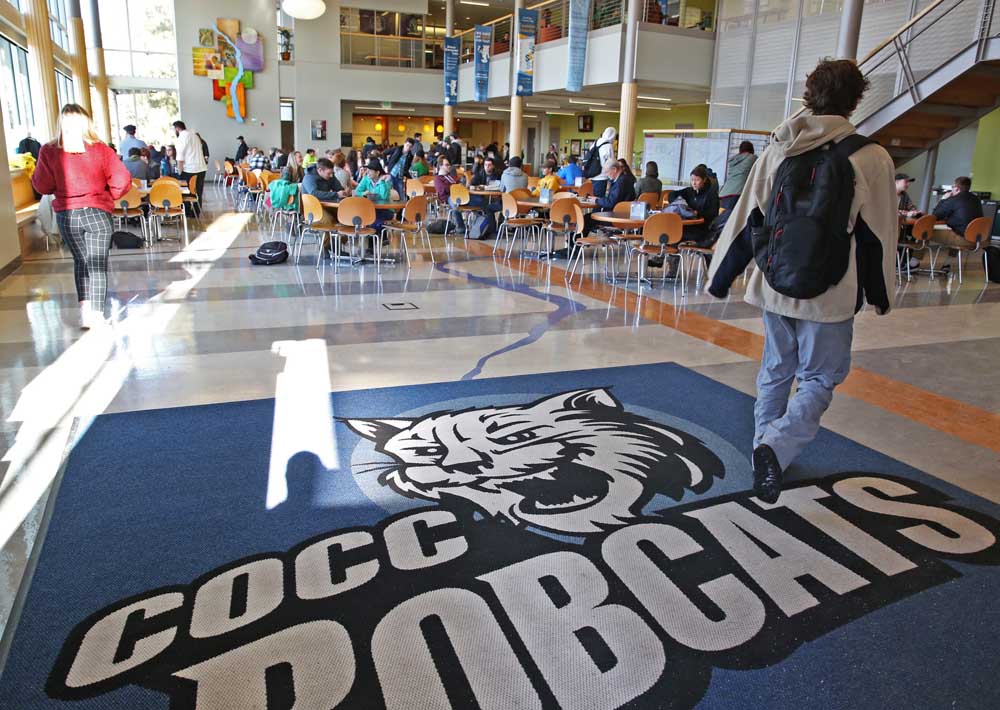COCC giving COVID-19 relief checks to about a third of its students
Published 4:45 pm Wednesday, May 20, 2020

- Students pass through the Coats Campus Center at Central Oregon Community College in Bend in November 2019.
Shyanna Williams was already receiving financial aid to study psychology at Central Oregon Community College when her fiance lost his job due to the COVID-19 pandemic. Because of that loss of income, bills started to pile up for essentials like car payments and internet, she said.
And Williams wasn’t willing to get a part-time job, because her youngest son has breathing difficulties and is especially vulnerable if she accidentally brings home the virus that causes COVID-19, she said.
“Being involved anywhere in public is scary to me right now, or else I would’ve picked up some kind of minimum wage job, just to help get by,” said Williams, a 23-year-old Redmond resident.
But Williams, along with more than 1,500 other COCC students reliant on financial aid or student loans, will catch a break this week.
Thanks to a federal COVID-19 relief grant of nearly $3.2 million, the college is giving these students checks, ranging from $525 to $1,025, to help with their tight finances.
“It was a huge relief,” Williams said. “Being able to pay those bills, and have a little extra cushion … it’s been super helpful.”
About one-third of the college’s student body will receive these one-time grants, according to COCC spokesperson Ron Paradis.
The checks will help COCC students in need during a difficult financial time, said Alicia Moore, the college’s vice president of student affairs.
“We’ve already heard back from a couple students who are grateful for these funds, and how this has helped them pay their rent, pay for transportation needs and things like that,” she said.
The checks will partially supplant the income many low-income COCC students would normally earn from their jobs, Moore said. Many service industry and minimum-wage workers have been furloughed, laid off or had their hours cut due to COVID-19 and social-distancing requirements.
“Whether it was an on-campus job or their local job in the community, a lot of students no longer have that opportunity to earn that additional income,” Moore said. “This helps fill in that gap.”
Furthermore, the grant could help students purchase the technology needed to attend the online, remote classes that COCC is holding during this time of social distancing, Moore said.
The vast majority of universities and colleges in the U.S. received funding from the federal government’s Higher Education Emergency Relief Fund, part of a larger $2 billion COVID-19 relief bill passed by Congress earlier this spring. The federal grants were calculated based on schools’ enrollment and number of students with high financial need, Moore said.
Each school is required by the federal government to spend at least 50% of its grant on financial aid grants for students. That means nearly $1.6 million is being given to about 1,565 COCC students this week.
The rest of the funding can go toward institutional aid, Moore said. But because the federal government’s guidelines for that are still broad, COCC leadership hasn’t decided how to spend that money yet, she said.
“Until we have that guidance, we’re a little hesitant to move forward,” Moore said. “The rules could change, and we don’t want to inappropriately use those funds.”
To qualify for the federal funding, students must be working toward earning a degree or certificate and must be registered in at least six credits, Moore said. Students must also be U.S. citizens, meaning students who are living in this country without legal permission cannot receive these federal checks, Moore said.
However, COCC will, through its nonprofit wing the COCC Foundation, hand out grants of the same size this week to 13 students who don’t have legal permission to live in the U.S.
“Our policy for years has been that any COCC student is eligible for our scholarships,” said Zak Boone, executive director of the foundation. “We don’t get involved in immigration policy. We just support all our students equally.”
Between 60% and 70% of the approximately $12,500 given to students who don’t have legal permission to live in the U.S. comes from the massive Portland-based nonprofit Oregon Community Foundation, which gives out a variety of grants to various organizations, Boone said. The rest of the funding comes from the COCC Foundation’s coffers.
Bend’s other higher education institution, Oregon State University-Cascades, is also giving federally-funded grants to its students reliant on financial aid. The university received $385,500, and will distribute that among 177 students, said Jane Reynolds, OSU-Cascades’ director of enrollment services and student success.
That means 17% of OSU-Cascades’ eligible students — not counting non-U.S. citizens and those not taking at least six credits — are receiving a check between $500 and $4,000, she said.
“So many of our students have lost their jobs because of the prevalence of folks working in the service industries and tourism,” Reynolds said. “This has been a huge help for them, in terms of helping with rent and putting food on the table.”






